This week, London mayor Sadiq Khan made headlines across the UK as he announced his latest pledge in the ongoing mayoral election race. Should he be re-elected – a possibility that many are considering a full-blown conclusion – Khan plans to launch the London Drugs Commission which will assess the potential benefits of alternative approaches to cannabis.
The mayor of London has various roles that revolve around the efficient social and economic development of the capital. One of these roles is to act as the de-facto police and crime commissioner for London, holding the Metropolitan police force to account.
But could the mayor of London actually enact meaningful changes around cannabis policy?
As part of his/her position as the Metropolitan police commissioner, the mayor has a say in how London is staffed and policed. While the London mayor may not have the power to officially decriminalise cannabis through the law, he/she could in theory effectively achieve the same outcome in the capital by instructing Met officers not to arrest individuals for personal use and possession of cannabis.
Similar measures have now been enacted in five police forces across the country, including in the Thames Valley and West Midlands. Instead, those found in possession of small amounts of any drug are referred to treatment or given harm reduction advice as opposed to criminal consequences. However, in practice, making this change in the capital may be more difficult.
In 2020, the Independent Office for Police Conduct recommended that police officers should stop carrying out stop and search measures based on smelling cannabis – a measure recently echoed by the Green Party’s mayoral candidate Sian Berry. However, forces across the UK, including the Met, still refer to this justification.
Furthermore, recent findings indicate that young. black men in the UK are around 19 times more likely to be stopped and searched for suspected cannabis possession than their white counterparts. So, what are the responsibilities of a mayor when it comes to community and race relations?


Following the initial reactions, Khan’s announcement left some, apparently including the Prime Minister himself, questioning whether the matter was actually any of Khan’s business. Others may wonder if a commission on cannabis reforms is the best way to go, considering the often non-consequential nature of such routes of “action”.
Take the government’s commission report on institutional racism in the UK (The Commission on Race and Ethnic Disparities), for example. Considered by many to be a knee-jerk reaction to Black Lives Matter protests taking place around the UK in an attempt to make the government appear like it was doing something.
The long-awaited publication of the report has received substantial backlash with many communities, as well as activist groups, charity organisations, and think-tanks, left feeling let-down by the conclusions of the report. While the document accepts the existence of racism in the UK, it outlines few recommendations that would address the issue at an institutional level.
Considering the nature of the issue, a commission on cannabis reforms in the capital may well be another waste of time and taxpayer money – especially considering that the evidence is already out there. Khan’s announcement has been interpreted by some as a way to win votes as the election approaches, or simply a move to appear “in touch with the people” without committing to meaningful change.
In a world where countries and jurisdictions around the world are frequently updating their approach to cannabis policy, it is hard to believe that the evidence needed to enact a comparatively small change, such as decriminalisation, doesn’t exist. Portugal alone has had decriminalisation in place for all drugs since 2001, with impressive results.
Moreover, the arrest rate for cannabis possession across the country has been falling year on year over the last decade. The number of recorded cannabis offences in London has also been on the decline, despite use rates remaining roughly the same, suggesting a general softening to police enforcement of cannabis laws in recent years.
This change of attitude by law enforcement, paired with the progressing change to public opinion across the UK – but particularly in the capital – and existing evidence gathered from other countries, should be enough to enact meaningful changes without the need for further reports and commissions.


Recent polls revealed that over half of Britons would now support cannabis legalisation, rising to two-thirds of Londoners. Industry experts and activists have estimated that a legal cannabis industry in the UK could be worth £2 billion by 2024.
All in all, Khan’s attitude to cannabis reforms in the capital appears to be a middle of the road approach when compared with proposals from other mayoral candidates.
The Green Party candidate, as previously mentioned, has adopted a similarly mild approach, while Liberal Democrat Siobhan Benita has been vocal about her belief that cannabis should be legalised. On the other end of the spectrum, the Conservatives’ candidate, Shaun Bailey, is apparently looking to maintain the status quo.
What seems clear is that, should Sadiq Khan be re-elected (which seems likely), it could still be a while before we see any meaningful changes to the approach to cannabis in London.

